Many, many people drink water that has no more filtration than what they get from a refrigerator water filter. Day after day, they fill glasses at those water dispensers built into the door of their fridge. They cool down their drinks with ice that goes through the same filter before it hits the ice maker. Is this wise? Is there enough filtration for whatever is in their water?
This is a question that should be asked both by those drinking water from their own wells as well as those drinking community water.
What Do These Filters Do?
The fundamental answer is this: They don’t do much. They are usually just carbon filters that remove a few contaminants that affect the taste and smell of their water. They will usually remove:
- Chlorine
- Lead
- Mercury
- Pesticides
That’s a good start but it’s not nearly enough. A simple carbon filter will not remove:
- Microorganisms like fungi, salmonella or coliform bacteria
- Chromium-6, also known as hexavalent chromium (remember Erin Brockovich?)
- Any of more than a hundred dangerous industrial chemicals
- Fluoride
- Microplastics
- Arsenic
- Pharmaceutical drugs
- Heavy metals
- Viruses
The other problem with refrigerator filters is the fact that to get the limited benefits of this filter, you have to change it every six months at least. To put it mildly, not everyone remembers to put in a new filter twice a year. The more overdue the replacement, the less effective the filter will be.
Should You Rely on a Refrigerator Filter?
The simple answer is: No. The slightly longer answer is that the right filtration system for your home depends on the contaminants present in your water. Whether you have well water or community water coming into your home, you need to know what contaminants need to be filtered out before making a decision.
That’s where testing your water comes in. When you know what you need to remove from your water, you can tailor your choice of filter to those specific contaminants. So test your water (both well water or community water) and find out what contaminants you are up against.
Types of Filters and Their Effectiveness
Whether you get an under-sink filter or a filter for your whole house, your basic choices are:
- Activated charcoal
- Reverse osmosis
- Ion exchange
- Distillation
A more detailed look:
- Low-end activated charcoal filters may only remove chlorine, much like refrigerator filters. Higher-end activated charcoal filters can also remove asbestos, lead, mercury and volatile organic compounds (VOCs).
- Reverse osmosis filtration systems filter out chlorine, trihalomethanes (byproducts of chlorine disinfection), VOCs, arsenic, fluoride, hexavalent chromium, nitrates, perchlorate and more. These filters do have a downside in that they waste very large quantities of water in the process of filtering. They also remove minerals needed for good taste and health such as iron, calcium and magnesium.
- Ion exchange systems remove calcium and magnesium (minerals that damage plumbing and household fixtures) along with fluoride, nitrates, sulfates, iron, manganese, barium, radium and perchlorate. Other contaminants remain unchanged. These filters may add salt to the water, which some people will want to avoid.
- Distillation removes minerals, many bacteria and viruses, and some chemicals. But it does not filter out chlorine, trihalomethanes or VOCs.
As you can see, no one filter does everything for everyone.
Testing Your Water First
An analysis of your water (either well water or community water) before choosing a filter will help you get the right filter for the substances you want to remove. If your community water supply or your well are within a few miles of industrial sites, airports or landfills, you will definitely want to find out what’s in your water as a first action.
You may want to know how to prolong the life of your appliances by knowing if you need to filter out calcium, magnesium, iron or other minerals. You might even find that you have radon (a radioactive mineral) in your water supply. There’s a very specific filtration system that will remove radon.
Your first test should be as comprehensive as you can afford. Then add the right filtration system for the contaminants in your water. Well water tests should thereafter be carried out annually or whenever the water quality seems to change. Community water tests can be repeated whenever you notice a change in your water quality.
Don’t Spend More Money Than You Need To
If you don’t test first, you could end up investing more money in a filtration system than you need to. That’s what is so great about working with ETR Laboratories on your water quality tests. We’ll talk with you after you get the results and tell you which type of filtration system would work best for your water. We don’t sell water filters so our advice is only meant to help you save money.
If you’re ready to find out what’s in your water, check out our water tests or call us at (800) 344-9977 to get started.

